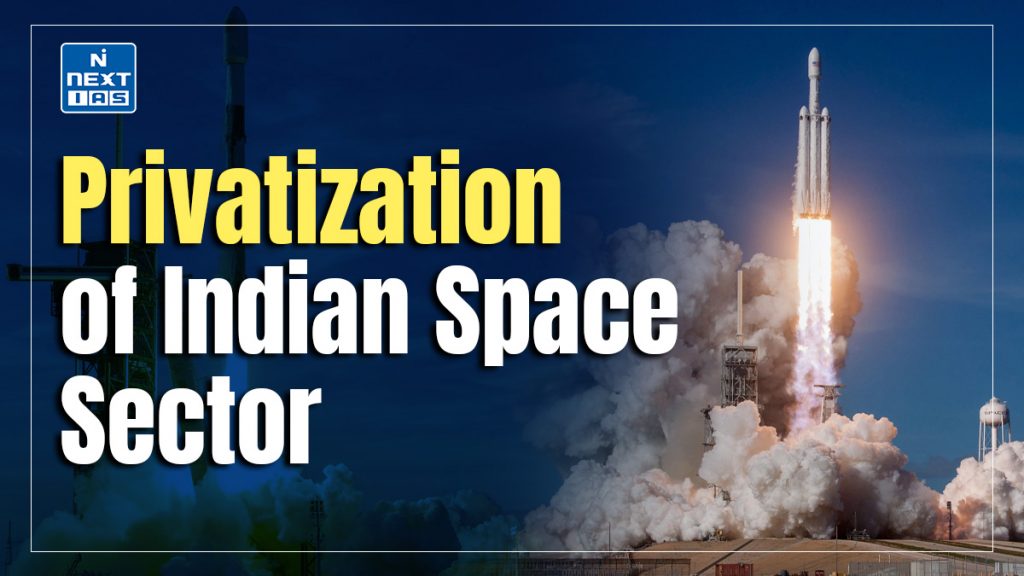
The privatization of India’s space sector marks a transformative shift, opening doors for private enterprises to engage in satellite development, space exploration, and allied services. This initiative, led by agencies like ISRO and IN-SPACe, aims to foster innovation, boost investments, and position India as a competitive global space player.
About The Privatization of Indian Space Sector
- India’s decision to privatize its space sector represents a strategic move to boost innovation, investment, and global competitiveness.
- Previously dominated by the Indian Space Research Organisation (ISRO), the sector is now open to private players through reforms introduced by the Indian government, including the establishment of IN-SPACe (Indian National Space Promotion and Authorization Center).
- This enables private companies to develop satellites, launch vehicles, and space exploration missions, while ISRO focuses on core research and complex missions.
- The privatization aims to accelerate technological advancements, create jobs, enhance India’s share in the global space economy, and establish India as a prominent spacefaring nation.
Which Reforms are proposed in Privatization of Indian Space Sector?
The privatization of India’s space sector includes several key reforms aimed at encouraging private industry participation and fostering innovation. Here are the main reforms:
- Establishment of IN-SPACe: The Indian National Space Promotion and Authorization Center (IN-SPACe) was created to act as a single-window agency for private companies, providing guidance, regulation, and access to ISRO facilities for research, testing, and launching space missions.
- NewSpace India Limited (NSIL): This public sector company was set up to oversee commercial activities, such as satellite launches and space-based services, allowing ISRO to focus on research and complex missions.
- Private Sector Participation in Satellite and Launch Vehicle Development: Private companies are now allowed to build, own, and operate their own satellites and launch vehicles, enabling them to create satellite constellations and other space-based technologies for various applications, including communication and remote sensing.
- Access to ISRO Infrastructure: Private players can use ISRO’s launch facilities, testing centers, and R&D labs. This infrastructure support lowers barriers to entry and enhances private sector capabilities.
- Development of Space Startups: The government has promoted a startup ecosystem in the space sector, providing financial and technical support to emerging companies, which fosters an environment for innovation and competition.
- Encouragement of International Collaboration: Indian companies are now allowed to engage in partnerships with international space organizations and businesses, enabling knowledge sharing, joint ventures, and access to the global market.
These reforms collectively aim to stimulate growth, drive advancements in space technology, and increase India’s share in the global space economy.
Why should the Private Sector be involved in the Space Industry?
- Increasing Demand: Indian Space Research Organisation (ISRO)’s annual budget has crossed ₹10,000 crore ($1.45 billion). However, demand for space-based services in India is far greater than what ISRO can provide. To fill this gap private sector investment is critical, for which a suitable policy environment needs to be created.
- Overall growth of the space sector: The Indian economy is having enough financial resources in the private sector. This can help in overall growth of the space sector to multi fold. Private sector participation is needed to ensure overall growth of the space sector.
- Country’s security: India’s reliance on GPS has proved costly during the Kargil war. The most basic way to secure our space capabilities is to distribute them across many different satellites and spacecraft, so that continuity is unaffected even if an adversary manages to disable one or more of our satellites. To counter such issues complete utilisation of our space potential is the need of the hour. For this we need Private sector help.
- International trends and experience: We can take examples from developed countries like the United states of America and others. For example Elon Musk’s “SpaceX” and its high profile projects have highlighted the increasing significance of the private players in the space sector
- Human Capital: With its high demographic dividend and lakhs of skilled engineering students, private sector participation can exploit the talent across the nation. This helps in proper utilisation of human resources in space sector
- Technological advancement: Commercialisation will allow integration of many other technologies like artificial intelligence, machine learining, Internet of things and others into space exploration activities. This experience from space activities, can help the private sector in utilising technology in other areas.
- Risk Sharing: Private sector helps in sharing the risk of cost factor as failure costs will be spread among both ISRO and private sectors. Failure can also be minimised due to increased experts availability as the private sector can attract potential people into the field.
Issues and Concerns of Private Participation in Space Industry in India
While the privatization of India’s space sector opens up numerous opportunities, it also brings certain challenges and concerns:
- Regulatory and Legal Framework: The lack of a robust legal framework specifically for the space sector raises concerns over issues like liability in case of accidents, data security, and compliance with international space treaties. Ensuring regulatory clarity is essential to encourage responsible participation.
- National Security Risks: Increased private involvement may lead to security concerns, as sensitive technology and data could be exposed to potential misuse or espionage. Strict monitoring and control mechanisms are needed to prevent security breaches.
- Intellectual Property (IP) Concerns: IP rights and technology transfer regulations are crucial to protect the interests of private players and prevent misuse of ISRO’s research and technology. Clearly defined IP laws for space technology are essential to avoid disputes.
- Funding Challenges: Space projects require substantial investment, and private firms may struggle to secure adequate funding, especially startups. The high-risk nature of space projects may deter private investors and financial institutions.
- Dependency on Government Infrastructure: While ISRO facilities are accessible to private firms, over-reliance on government infrastructure can slow down the growth of independent private capabilities. Developing dedicated infrastructure is costly but crucial for sustainable private growth.
- Competition and Market Saturation: Entry of numerous players can lead to fierce competition and potential market saturation, which may pressure smaller players. This could lead to consolidation, limiting competition in the long run.
- Risk of Profit-Driven Approaches: Private companies may prioritize profit over scientific research and innovation, focusing on lucrative projects rather than exploration. Balancing commercial objectives with space research’s broader goals remains a challenge.
- Environmental Concerns: An increase in satellite launches could contribute to space debris, leading to long-term environmental concerns in orbit. Strict guidelines on debris management are needed as private launches increase.
Addressing these issues with clear policies and support mechanisms will be essential to harness the potential of private participation in India’s space sector while mitigating risks.
Way Forward
To advance privatization in India’s space sector, the government should establish clear regulatory frameworks, offer incentives for private investments, and foster partnerships between ISRO and private firms.
Strengthening bodies like IN-SPACe to streamline approvals will encourage innovation. Supporting startups with funding, technology access, and simplified compliance will further boost participation. Additionally, creating a collaborative ecosystem for knowledge-sharing, skill-building, and infrastructure development will enhance India’s competitive edge and drive sustainable growth in the global space economy.
Conclusion
Privatization of India’s space sector fosters innovation, enhances global competitiveness, and attracts private investments, driving economic growth.
By enabling private players to participate, ISRO can focus on advanced research, while the sector benefits from increased efficiency, job creation, and technological advancement, positioning India as a major space industry player globally.
GS - 3





